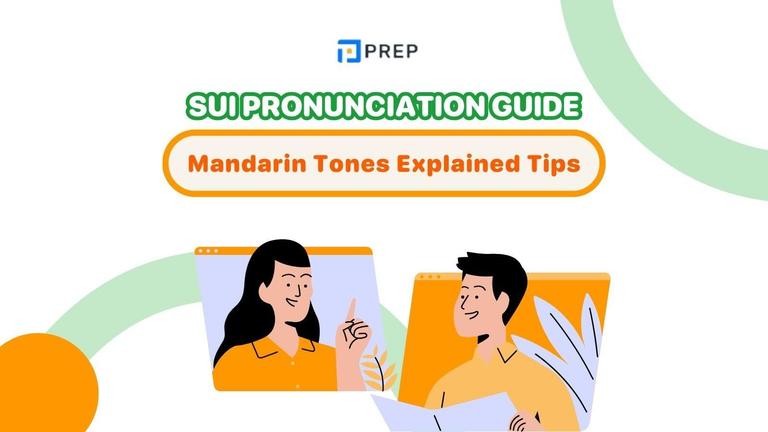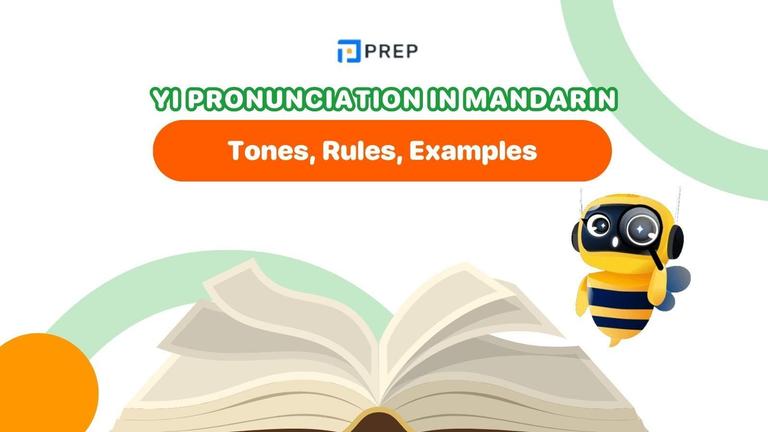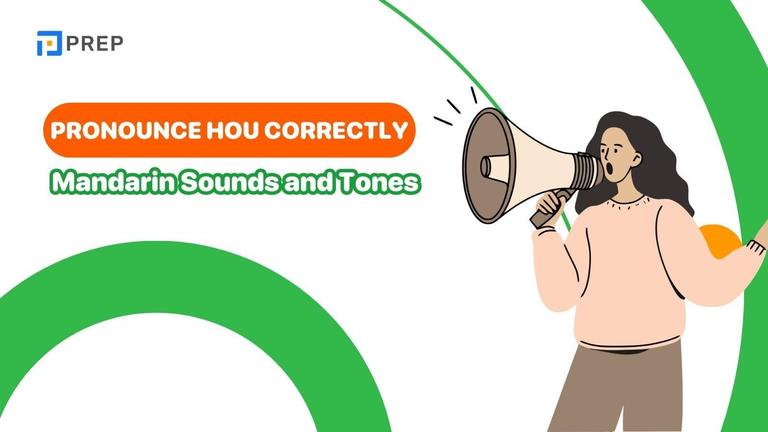Sample IELTS Speaking Part 2 + 3 topic "Describe a polluted place"
The prompt "Describe a polluted place" is frequently featured in the IELTS Speaking Part 2 exam. To assist test-takers in practicing effectively and attaining a high band score, this article provides an outline, specific ideas, note-taking strategies for the one-minute preparation time, a detailed sample response, and useful vocabulary. Review the following content to excel and aim for a band score of 7.5 or higher!
- I. Sample IELTS Speaking Part 2: Describe a polluted place
- II. Sample IELTS Speaking Part 3: Pollution
- 1. What kinds of pollution are serious in your country?
- 2. What can individuals do to protect our environment?
- 3. Why should the government be involved in environment protection?
- 4. Is it important to teach students about environmental protection at school?
- 5. In the future, what do you think some of the effects of global warming?
- III. Conclusion
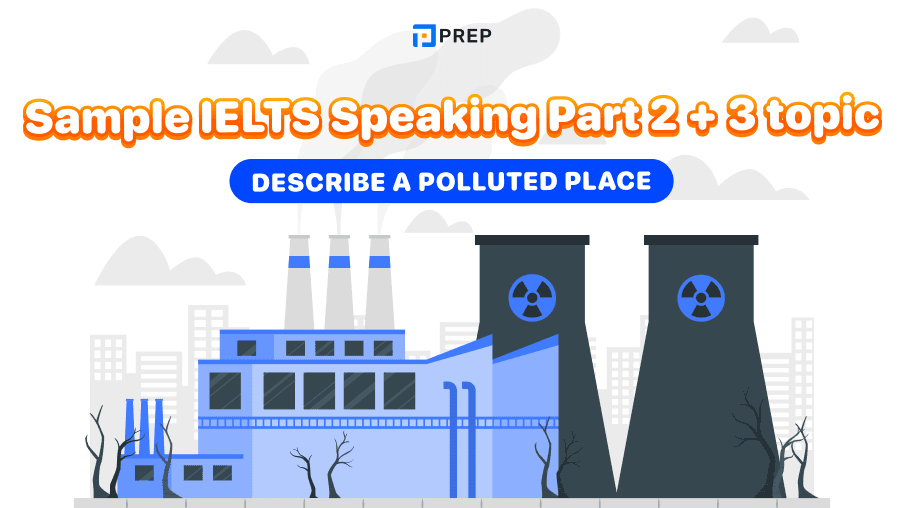
I. Sample IELTS Speaking Part 2: Describe a polluted place
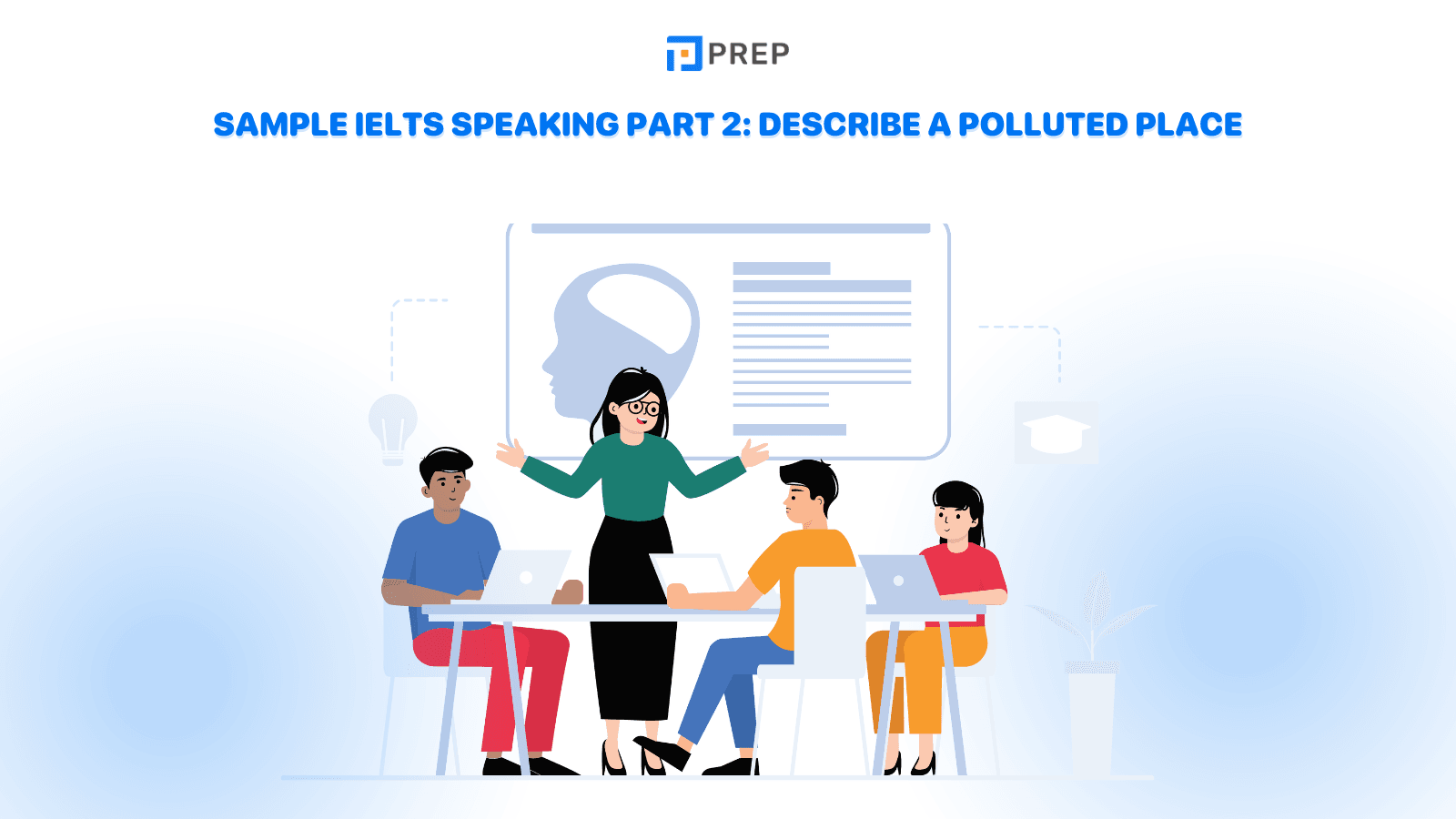
1. Cue card
Describe a polluted place. You should say:
-
Where the place is?
-
When did you visit this place?
-
What kind of pollution did you see there?
And explain how this place was affected.
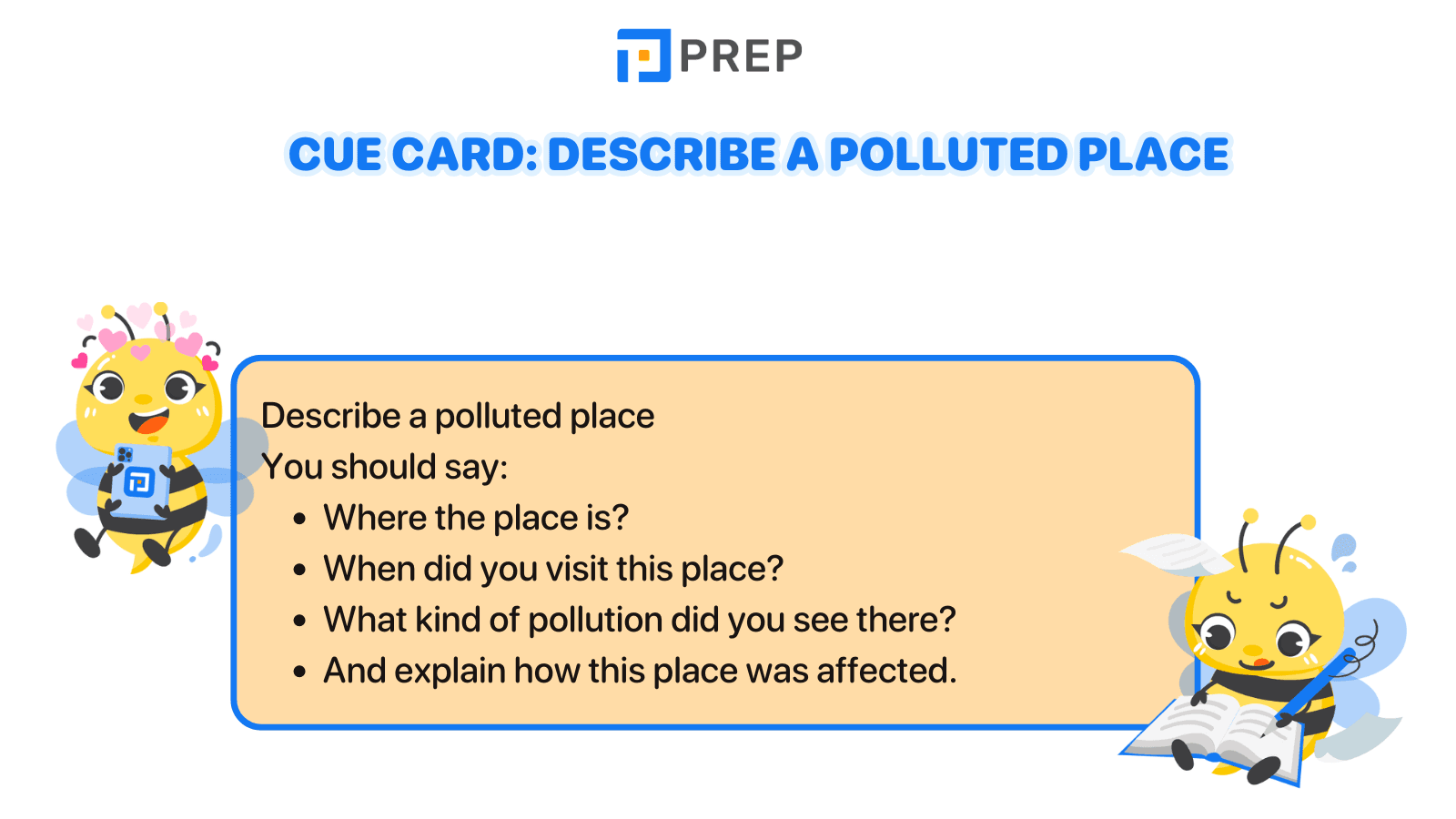
2. Outline: Part 2
2.1. Idea
-
The "Describe a polluted place" task requires test-takers to describe a place that is polluted. To do this well, you need to provide the following information:
-
What is the place?
-
When have you visited this place?
-
What types of pollution have you observed there?
-
Explain the impacts on the area.
-
-
The "Describe a polluted place" task falls under the broader topics of Events and Places. The most effective way to approach this task is to answer each bullet point, which will help you organize your response, avoid rambling, and be more effective.
-
For the first question - what is the place? - this is generally quite easy to answer, as there are many polluted places in the world, including in Vietnam.
-
Next, you need to go into more detail with the second question - when have you visited this place? In addition to sharing when you were there, you can also describe the context and other conditions of the location. In your response, try to incorporate past tenses and sequencing devices from the Events topic to fully address the "Describe a polluted place" task.
-
Building on this, you can then answer the third question - what types of pollution have you observed there? Here, you can share more and contrast or continue from what is known (portrayed in the media) and what you observed at the site.
-
Finally, and most importantly, you need to explain the impacts of the pollution on the area.
-
Spend the most time on this, as it is the core focus of the task. You can integrate this thorough explanation with the types of pollution you described earlier.
-
To provide a clear, coherent, and on-point response, you should present your points clearly, potentially separating them by direct or indirect impacts. Don't forget to convey your emotions through your tone of voice as you answer.
-
2.2. One-minute note taking
|
Where is the place? When did you visit this place? (Context of the Event) |
Hanoi - my birthplace |
|
Since the day I was born |
|
|
What kind of pollution did you see there? And explain how this place was affected. |
Traffic congestion → worse Masks → avoid chemical substances and micro dust → respiratory system (people of all ages)
Trashes all over the surface, even in landmarks. → worsen the image of Hanoi + accelerate water processing fees → rarer pure water |
3. Sample Speaking: Describe a polluted place
Below is a sample and some vocabulary for the IELTS Speaking Part 2 topic Describe a polluted place. Review this to effectively practice IELTS Speaking at home!
Let's listen to the IELTS Speaking Part 2 sample - Describe a polluted place:
When receiving the cue card, it is a bit sad for me to admit that the first city to spring to my mind is nowhere else but the place where I was born and bred - Hanoi. I’ve been living here since I was born, I can say that this city is quite a tight spot when it comes to pollution.
Take the sky for example, instead of a clear blue sky, most of the time all we can see above our heads is a grayish sky full of smog, even on the brightest days of summer. I don’t mean to exaggerate, but there were days when the city was covered by a blanket of fog. It’s fair to say that air pollution has now engulfed Hanoi, especially in the areas where traffic congestions happen every day.
This is getting worse as you can barely notice anyone without a mask on the crowded streets of Hanoi, you know, to stay away from harmful substances and micro dust. Some people even have an air purifier at home, all of these are to protect ourselves from contractingrespiratory diseases while living in such a place.
And not just the air, the water here is severely polluted as well. I could never forget the smell of rubbish from those rivers along my way to school, yet I couldn’t understand how people still built their sewage lines leading directly into the river, and of course, live their whole lives with its contaminated water.
I am quite afraid that one day once these rivers are badly polluted to its greatest extent, we would even have to buy water with the price of a gold leaf - which has already been the case in China. But let’s not wish for that reality to happen, as I believe our authorities are trying their best to ameliorate this situation so that the next generation can breathe in much better air.
Note: This IELTS Speaking Part 2 sample can also be used for other topics such as: Describe a polluted place in Vietnam; Describe a polluted place you visited; Talk about a polluted place you visited; Describe a place affected by pollution; etc.
Some useful vocabulary used in the sample Describe a polluted place:
-
spring to my mind (v): come to mind
-
a tight spot (n): a trouble spot
-
Grayish (adj): greyish
-
Smog (n): hazy air pollution from vehicles
-
Exaggerate (v): to overstate or make too large
-
A blanket of fog: a thick layer of fog
-
Engulf (v): to surround and cover completely
-
Traffic congestion (n): heavy traffic jam
-
Stay away from (v): avoid something
-
Micro dust (n): fine particulate matter
-
Contract (v): to get/develop a disease
-
Respiratory disease (n): illness affecting the breathing system
-
Sewage line (n): waste disposal pipe
-
Contaminated (adj): polluted or poisoned
-
To its greatest extent: to the maximum degree
-
Wish for sth to do sth: to hope that something will happen
-
Ameliorate (v) to improve
For more information, please refer to the following article:
50+ bài mẫu IELTS Speaking Part 2 phù hợp với band điểm 6.5+!
II. Sample IELTS Speaking Part 3: Pollution
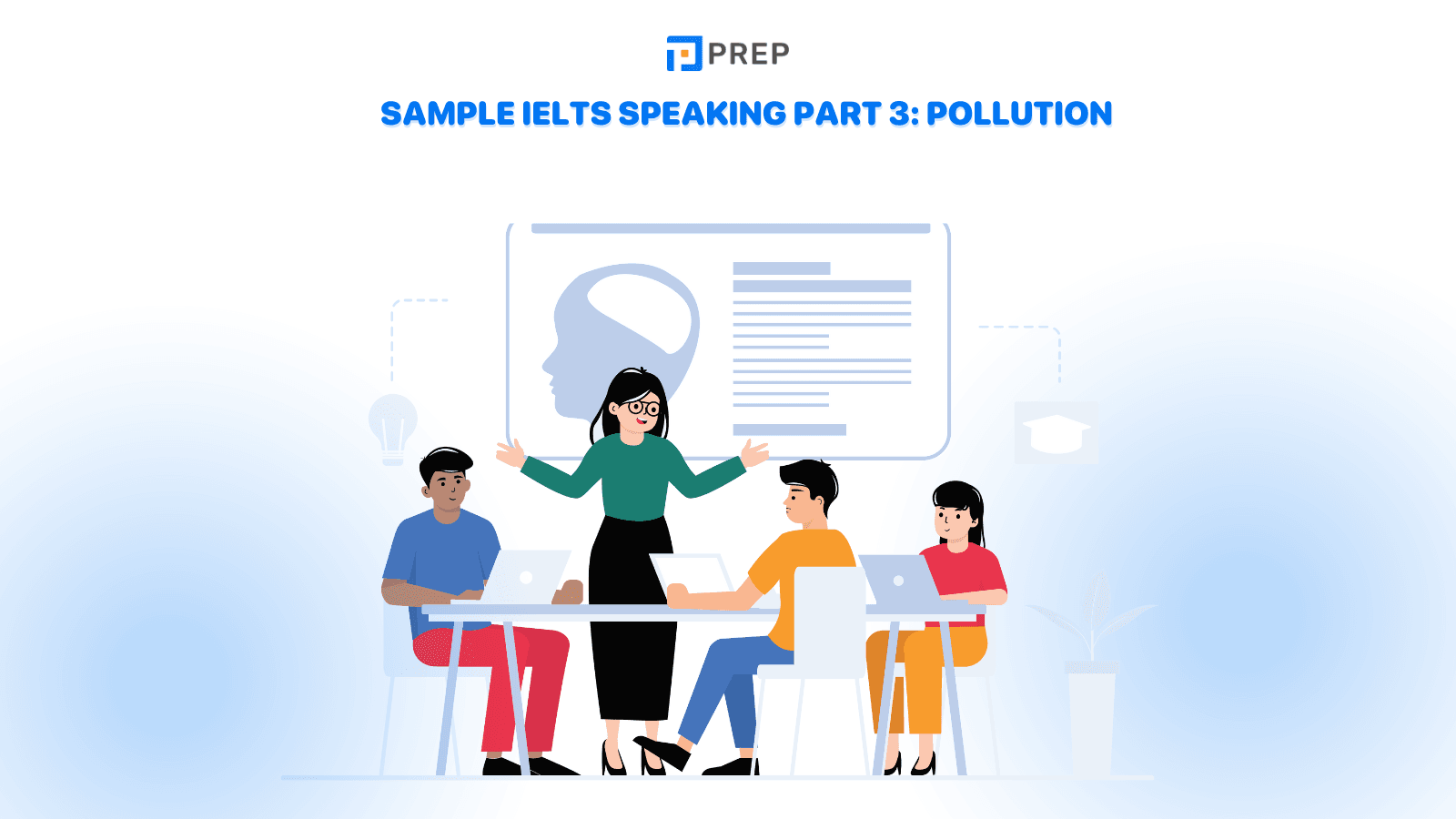
Let's listen to the IELTS Speaking Part 3 sample - Pollution:
1. What kinds of pollution are serious in your country?
Oh, I hardly know where to start, as unfortunately, Vietnam is suffering from all sources of pollution. But I guess the most alarming is our recent world record for air pollution, causing all citizens to put a mask on everytime they go outside. This is partly due to the industrialization process where more energy needs burning, which means more exhaust fumes emitted.
I would also want to add the traffic congestion during peak hours in megacities as this results in not only an increased level of air pollution, but also noise pollution. Altogether these effects can take a toll on our health and it is no exaggeration to say that living here is like dying, but at a slow rate.
-
Suffer from (v): to experience the consequences of
-
Alarming (adj): worrying, causing concern
-
World record: a record that is the best in the world
-
Exhaust fume: vehicle emissions, smoke from exhaust
-
Emit (v): to release, discharge
-
Peak hour: the busiest time of day
-
Megacity (n): a very large city, a metropolis
-
Take a toll on sth: to have a detrimental effect on something
2. What can individuals do to protect our environment?
Through sustainable actions every day, I believe each person can make the most significant impact on preserving the environment. There are several ways we, as individuals, can work to achieve this in our home lives. Shifting to sustainable food products can really help in the long run I think. While it may be hard to make the change, navigating away from a meat-focused diet can help protect the environment.
As an aware consumer, we should also buy more organic or locally sourced food as these options often are more sustainably produced and require less transportation, which obviously means less carbon footprint that harms the environment.
-
Sustainable (adj): able to be maintained at a certain level or rate
-
Preserve (v): to maintain, protect, and keep safe
-
Shift to sth (v): to transition, move, or change to something
-
In the long run: over a long period of time in the future
-
Navigate away from (v): to gradually move or steer away from something
-
A meat-focused diet: a diet centered around consuming a lot of meat
-
Locally sourced food: food that is produced or obtained from nearby sources
-
Carbon footprint: the total amount of greenhouse gas emissions caused by an individual, organization, event, or product
3. Why should the government be involved in environment protection?
I am afraid that just a shift in individual lifestyles won’t be enough to save our planet, but it calls for systemic changes from the government, who is greatly responsible for those industrialization policies. Believe it or not, even if every individual personally chooses to become vegan, leads a car-free lifestyle, the total amount of carbon footprint reduced won’t be substantial enough, compared to that produced by the heavy industries.
Therefore, changes to our national energy grid, a carbon fee and dividend are some examples of visionary policies that could actually make a difference as they get to the root of the problem. That is not to deny individual efforts, but to emphasize on how significant it would be to involve governmental decisions in the process of making this world a better place.
-
Systemic change: a fundamental change to an entire system
-
Lead a … lifestyle: pursue a particular way of living
-
Heavy industry: industries that involve manufacturing and production of large, heavy products
-
National energy grid: the interconnected network that delivers electricity across a country
-
Dividend: a payment made by a company to its shareholders
-
Governmental decision: a decision made by the government
4. Is it important to teach students about environmental protection at school?
Absolutely yes, indeed I believe that the fate of the Earth is in the hands of our children and with our help from environmental programs at schools, they have the power to make a substantial difference in the future.
Being introduced to the environmental impact of their daily life and the concept of sustainability, children, from an early age, can stay informed about potential future hazards such as poor air quality and polluted drinking water, therefore establishing lifelong habits that will work towards living a greener life. I couldn’t wait to live in a place where all adults are sustainable consumers, eliminating the largest possible amount of carbon footprint.
-
In the hands of: under the control or influence of
-
Substantial (adj): large in amount or scale
-
Stay informed: to be well-informed or up-to-date on a topic
-
Hazard (n): a source of danger or risk
-
Lifelong habit (n): a habit or practice that lasts throughout one's life
-
Work towards sth: to make efforts directed at achieving something
-
Sustainable consumer: a consumer who makes environmentally-friendly purchasing choices
5. In the future, what do you think some of the effects of global warming?
Many of us have seen, and even experienced, the effects of climate change. But it is not just about extreme weather like floods, droughts and hurricanes, on a larger scale, I do fear that these consequences will become more frequent and more intense in the coming decades. It tears me to say that children have contributed the least to the climate crisis, but will pay the highest price.
Once global warming is not well-addressed, extreme events, including wildfires, floods and hurricanes, would become a frightening new normal. Hotter temperatures, air pollution and violent storms are leading to immediate, life-threatening dangers for children, including malnutrition and higher risk of infectious diseases. That would never be a world where I want to imagine myself in, not to mention my children to grow up in, I have to say.
-
extreme weather: weather conditions that are very severe or unusual, such as heat waves, droughts, floods, or storms
-
on a larger scale: at a greater magnitude, extent, or level
III. Conclusion
This article has provided a sample IELTS Speaking Part 2 response on the topic of Describing a Polluted Place. Refer to the details of the article to effectively practice and prepare for the test at home, and conquer a high Speaking band score in the actual exam!

Hi I'm Chloe, and I am currently serving as an Product Content Administrator at Prep Education. With over five years of experience in independent online IELTS study and exam preparation, I am confident in my ability to support learners in achieving their highest possible scores.
Comment
Premium content
View allPersonalized roadmap
Most read








